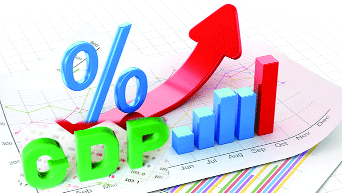Economic crisis needs to be taken into account
Mahfuz Emran: Real sectors of the economy (agriculture-industry-services) will not fare well if the dollar runs like a mad horse against the buck and high inflation continues. Bangladesh’s macroeconomics was stable for a long time, which is not the case now. For this reason, the challenges, uncertainties and fears related to commodity prices, foreign exchange flow, debt repayment, export trade etc. must be taken into consideration. By no means should the government suffer from complacency. The concerns that have arisen now must be taken into account and resolved through efficient economic management. And after the election, we have to go for major reforms.
In a session of the annual conference of Bangladesh Institute of Development Studies (BIDS) at a city hotel, the former governor of Bangladesh Bank Dr. Salehuddin Ahmed and Policy Research Institute (PRI) executive director Ahsan H. Mansoor expressed such opinion. Ahsan Mansoor gave a public speech titled ‘Macroeconomic Challenges and Policy Options of Bangladesh’.
Dr. Salehuddin Ahmed said, there are challenges in the economy now; There is uncertainty. But the fear of US sanctions is the biggest fear now. What will happen to the export sector if the ban is imposed – that is the big question. Regarding economic reforms, he said, businessmen and policy makers are now united. There is no difference between them. Reforms will not be possible if policy makers and businessmen are mixed like this. (See Page-7)
(From Page-8)
Salehuddin Ahmed also said that banks, newspapers and television are in the hands of businessmen. They are influencing policy making. The number of directors from the same family in the bank has been increased.
The term of directors is 12 consecutive years. Banking sector reforms are going backwards. According to him, there are wrong policies behind the crises that have arisen in the macro economy as a whole. Long-term fixed exchange rates have reduced competitiveness in exports. Now there is a huge financial deficit. If foreign investment does not come, there will be deficit. Do not be discouraged by the problems that have arisen at present; Rather than being complacent, the economist suggested taking effective steps to solve the problem.
Ahsan H. Mansoor commented that in view of the decline in foreign exchange reserves and the large deficit in the country’s finances, there is a need for a comprehensive plan to repay the foreign debt in the public and private sectors. He said that in order not to fail in the repayment of the loan, the repayment period should be increased by meeting with the lenders if necessary. A three-to-five-year period plan should be taken for how to settle the liabilities.
Ahsan H. Mansoor feels that there is uncertainty about whether foreign loans, especially short-term loans, can be repaid on time. He told the policy makers, sit with the creditors; Go to Singapore, go to Dubai. Talk to them. If necessary, take extra time to repay the loan. But it should not be ‘failed’ by any means. Bangladesh has no record of defaulting on its national debt.
He said, the reserve is now below $20 billion. The fiscal deficit is about four billion dollars. In this situation, there is concern about repayment of liabilities in the near term. However, the actual picture of how much foreign debt has to be paid in the near term is not known. The private sector now has a short-term credit position of $12 billion; Four billion dollars must be paid in the energy sector. Apart from this there are payments of LC, payment of dividends of foreign companies and other payments. So, a specific plan is needed.
Ahsan H. Mansoor said regarding the financial management of the government, do not use the economy for political interests. Management should be done in such a way that the stability of macro economy is maintained. Bangladesh Bank has made the mistake of keeping the interest rate and exchange rate at the same place, the current situation has been created due to its effect. The private sector is now paying higher interest by borrowing at much lower interest rates. Again, the exchange rate has increased so much, only for this reason they have to pay one lakh crore rupees extra. According to him, the current crisis in the economy is not only responsible for Corona and the Russia-Ukraine war; It is also responsible for internal mismanagement.
Ahsan H Mansoor feels that the real picture of the banking sector is worse. This sector is very shallow. The real picture of defaulted loans is much more than paper. Bank deposit growth is now below 8 percent, which was 16 to 18 percent. He questioned how the investment in the economy will increase if the saving is reduced in this way.
According to him, the debt-GDP ratio of the government is low, which is not disputed. But debt repayment capacity depends on revenue collection. The ratio of revenue to foreign debt in Bangladesh is as high as 400 percent, which is alarming. This is because Bangladesh’s tax-GDP ratio is only 8 percent; Which is less in any country. Comprehensive tax reform is needed to get out of this situation. Tax administration and tax policy need to be separated. If the tax is not increased, the situation will have to be solved by printing money. As a result, inflation will increase further. In the question-and-answer session, the chairman of PRI. Zaidi Sattar said that there was stability in macroeconomics in Bangladesh for at least 25 years. However, Corona and Ukraine war have had many negative effects. Just warning messages should not be given without taking this into consideration. There are also many positive aspects to the economy that need to be highlighted.
Rare Israeli airstrike in Beirut kills Hezbollah commander and more than a dozen others
International Desk: Israel launched a rare airstrike that killed a senior Hezbollah milita…








